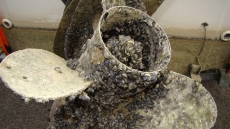VANCOUVER — Sailing across the Atlantic Ocean by wind power alone is an impressive achievement by any standard.
But contending with the unpredictable weather, busy freight traffic, meddlesome fishing nets and treacherous icebergs without anyone in the pilot's seat is another feat entirely.
This summer, a team of engineering students from the University of British Columbia is hoping its 5.5-metre-long boat will sail into the history books as the first seafaring vessel to successfully traverse the Atlantic entirely solo.
"It's been tried many times but never actually successfully," said Kristoffer Vik Hansen, co-captain of the 66-person UBC robotic sailboat — or Sailbot — team.
"Basically we're trying to make a big, big sailboat, make it autonomous and sail it across the Atlantic Ocean."
Come August, the crew plans to launch the still un-christened sailbot off the coast of St. John's, N.L., and hope the vessel survives the 2,900-kilometre, three-week journey to Dingle, Ireland.
"This project is cool because it mixes something that's really old and something that's really new," said Vik Hansen, standing beside the ship's still-under-construction hull inside the sailbot team's tool-strewn, on-campus shop.
Hanging above the bustling workplace are the smooth, water-worn hulls and logo-covered sails of the team's previous competition champions.
"Sailing has been around for thousands of years. Robotics has not been around for that many years," he added. "It's kind of the intersection of two very different disciplines."
While the university's sailbot team has officially existed since 2006, its most recent project has been in the works only since 2012, following three successive first-place finishes in international sailbot regattas.
The crew's continuing success with several smaller two-metre boats helped provide the inspiration behind tackling this summer's more ambitious, trans-Atlantic challenge.
To complete the journey the sailbot will use solar panels to power a slew of onboard navigation and obstacle-avoidance technology, including thermal imaging to sense boat traffic and icebergs, as well as GPS co-ordinates to steer around inclement weather and fishing zones.
Vik Hansen described the project as an interdisciplinary venture, combining mechanical, electrical and software engineering expertise to overcome the unique challenges posed by trans-ocean travel.
"The uniqueness comes in how we're basically melting together the different parts of engineering," said the fifth year integrated engineering student, originally from Norway. "That's where we're unique."
A number of university and corporate sponsors are underwriting the $60,000 project. The total cost is now expected to come in slightly above that figure in order to allow the team to install on-board backups that will safeguard against any systems failing partway through the voyage.
Still, the need to consider every possible scenario in a real-life situation is part of the project's appeal, said Vik Hansen.
"It's not some kind of lab where everything's tip-top shape," he said. "You're working with real nature; you're sailing on the ocean."
Vik Hansen said there is little demand for automated sailboats in real-world applications. However, the team's route-finding programs that take into account and respond to factors such as weather patterns and trade routes could hold commercial value for modern-day ships.
As for this summer's trans-Atlantic challenge, once the boat launches the team is not permitted to interfere with its journey. That won't stop them from travelling overseas to celebrate the sailbot's anticipated success.
"When we go over to Ireland and we're out there, waiting for it to come towards us, and we see it coming towards the finish line, that's going to be the moment," said Vik Hansen, smiling broadly.
"That's when the champagne comes."




